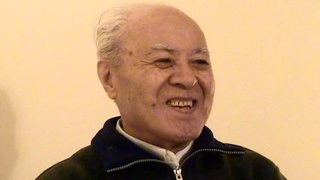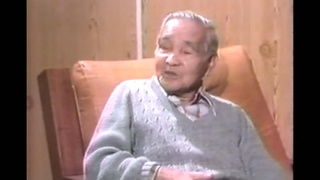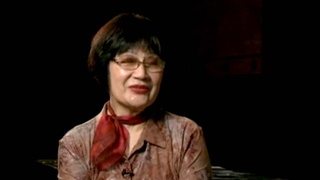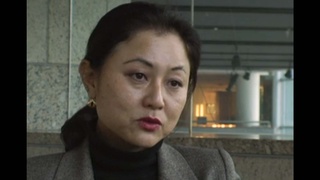Interviews
Didn’t speak Japanese until moving to Japan
At the time I never, never spoke Japanese in Minot, I don’t remember talking, yeah in Japanese, or…we always conversed in English and so until we landed in Yokohama and then even then you know, I don’t know, I was looking at my brother and, you know I think I remember saying something like, oh my! Oh my! Hunk of baloney or something. [laughs] Yeah, and then at the boat, my uncle came up to the deck, you know came up, and then he asked, I guess he asked in Japanese, are you Suto? And I remember I answering yes, and you know that’s [laughs] yeah, that the first conversation, yeah, that I had in [with] Japanese people we had, in Japanese.
Date: June 17, 2008
Location: California, US
Interviewer: Janice Tanaka
Contributed by: Watase Media Arts Center, Japanese American National Museum
Explore More Videos


Initial struggles with the language barrier (Japanese)
(b. 1917) Okinawan, Issei Argentinean

Decided to leave Japan to Argentina (Spanish)
(1925-2014) La Plata Hochi, Journalist

Tango makes him to stay in Argentina (Spanish)
(1925-2014) La Plata Hochi, Journalist


His first jobs in Argentina (Spanish)
(1925-2014) La Plata Hochi, Journalist


Going to Brazil to escape debt (Japanese)
(1911-2010) Founder of JACTO group


Treatment of Japanese Paraguayans during World War II (Spanish)
Nisei Paraguayan, Researcher

Inclusiveness of the first Japanese colony in Paraguay (Spanish)
Nisei Paraguayan, Researcher

Nikkei contributions to Paraguayan agriculture (Spanish)
Nisei Paraguayan, Researcher

Leaving for the States without telling my parents (Japanese)
Shin-Issei from Gifu. Recently received U.S. citizenship

Grandmother convinced his mother to return to Canada
(b. 1928) Doctor. Former Chair of the Japanese Canadian Redress Foundation.

Government urged Japanese Canadians to go to Japan
(b. 1928) Doctor. Former Chair of the Japanese Canadian Redress Foundation.
